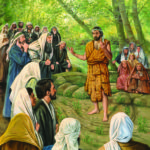The text for this lesson is Jonah 1–3
Key Point
- God pours out His steadfast love for me, forgiving me and using me, a sinner, in the work of His kingdom.
- Law: I love mercy when I benefit from it, but if I think someone is evil, I don’t want God’s mercy to extend to that person.
- Gospel: Fortunately, God’s desire to make His mercy known wins the day, and though I don’t deserve it, God shows the same mercy to me that He shows to others.
Context
- Nineveh, the capital of Assyria, was located east of the Tigris River in the northern part of present-day Iraq. The Assyrians were renowned throughout the ancient world for their cruelty. To call Jonah a reluctant missionary would be an understatement. He absolutely did not want to go to Nineveh. Jonah wanted the Ninevites to get what they deserved. God’s love, however, is relentless, even with cruel people.
Commentary
- When Jonah is first commanded by the Lord to preach to Nineveh, he goes instead to Joppa and pays for passage to Tarshish. Nineveh is an inland city, about five hundred miles east of Jonah’s home. It is an arduous overland journey that would have taken at least a month. Tarshish may refer to ancient Carthage (near modern-day Tunis, Tunisia) or ancient Tartessus (near modern Andalusia, Spain). Regardless of which option the text refers to, Tarshish was at least fifteen hundred miles west of Nineveh.
Why did Jonah flee? He himself explains in the book’s final chapter: “O Lord, is not this what I said when I was yet in my country? That is why I made haste to flee to Tarshish; for I knew that You are a gracious God and merciful, slow to anger and abounding in steadfast love, and relenting from disaster” (4:2).
Jonah did not want to preach God’s Law to the Ninevites because he wanted them to die. He didn’t want them to repent. He didn’t want God to show mercy. They were an evil, bloodthirsty people, and Jonah wanted them to burn. In verse 5, he even sits in the shade and watches the city for a while, hoping perhaps that God will change His mind and wipe it all out.
God, of course, does not do what Jonah wants. It isn’t until a hundred years later, after all the repentant Ninevites are dead, that God judges Nineveh (see the Book of Nahum). The Book of Jonah ends with God’s announcement that He forgave all 120,000 of the Ninevites and spared both them and their cattle.
There are two other important features in this book. The first is Jonah’s three-day sojourn in the belly of the fish. While the art depicting Jonah inside a whale may be accurate, we actually don’t know. The Hebrew word can refer to any sea creature. While in the belly of the fish, Jonah prays (in part), “Out of the belly of Sheol I cried, and You heard my voice” (Jonah 2:2). Jonah prays as though he is already dead. In Matthew 12:40, Jesus says, “For just as Jonah was three days and three nights in the belly of the great fish, so will the Son of Man be three days and three nights in the heart of the earth.” When Jonah was tossed into the sea and swallowed by the great fish, he likened it to descending into Sheol, the grave. Some scholars believe that Jonah literally may have died in the sea and was resurrected when he was regurgitated onto the shore. Whether Jonah died in the belly of the fish or not, his
three-day “entombment” is an Old Testament story of dying to sin and rising to new life in Christ.
Finally, it is important to note that the prophecy Jonah delivers in 3:4 does not come true. This does not mean, though, that Jonah is a false prophet. He speaks the word God commands him to speak, and that word does exactly what God sends it to do. It convicts the Ninevites of their sin and brings them to repentance, that they can hear the Word of the Gospel and receive the salvation Jesus will win for them on the cross.







